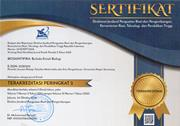The Effectiveness of Plastic Mulch for Maintaining the Potato Farmland in Dieng Plateau Using Soil Biological Quality Index
(1) Master of Biology, Faculty of Science and Mathematics, Universitas Diponegoro
(2) Master of Biology, Faculty of Science and Mathematics, Universitas Diponegoro
(3) Master of Biology, Faculty of Science and Mathematics, Universitas Diponegoro
Abstract
Dieng farmers apply plastic mulch to reduce erosion and to prevent the loss of nutrients. This study aimed to determine the effectiveness of plastic mulch in maintaining the quality of potato farmland using the Soil Biological Quality Index (QBS-ar) based on the existence of microarthropods. Soil sampling was conducted in six different locations, i.e., flat area with mulch, sloped area with mulch, the flat area without mulch, sloped area without mulch, flat forest area, and sloped forest area. Microarthropods were obtained from soil samples using a Berlese Funnel method. Soil quality was analyzed using QBS-ar index which was calculated based on Eco-morphological Index (EMI). The results showed that the value of QBS-ar index in potato farmland with the use of plastic mulch was much higher than in farmland without plastic mulch in bothflat and sloped area. Compared to the soil in the forest area, the value of QBS-ar index in farmland with the use of plastic mulch, especially in the flat area, was relatively similar. Hence, the use of plastic mulch for potato cultivation in the hilly area is effective in maintaining soil quality. This finding would be beneficial for developing a soil conservation strategy to achieve sustainable agriculture in Dieng agricultural area.
Keywords
Full Text:
PDFRefbacks
- There are currently no refbacks.

This work is licensed under a Creative Commons Attribution 4.0 International License.


